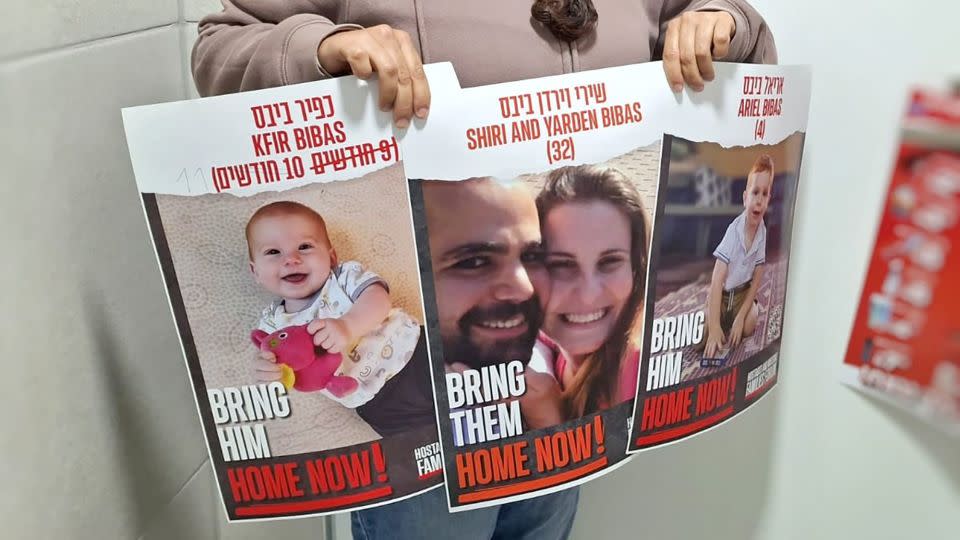Hamas tells negotiators it doesn’t have 40 Israeli hostages needed for first round of ceasefire
Hamas has indicated it is currently unable to identify and track down 40 Israeli hostages needed for the first phase of a ceasefire deal, according to an Israeli official and a source familiar with the discussions, raising fears that more hostages may be dead than are publicly known.
The framework that has been laid out by negotiators says that during a first six-week pause in the fighting, Hamas should release 40 of the remaining hostages, including all the women as well as sick and elderly men. In exchange, hundreds of Palestinian prisoners would be released from Israeli prisons.
Hamas has told international mediators – which include Qatar and Egypt - it does not have 40 living hostages who match those criteria for release, both sources said.
CNN’s record of the conditions of the hostages also suggests there are fewer than 40 living hostages who meet the proposed criteria.
The inability - or unwillingness - of Hamas to tell Israel which hostages would be released, alive, is a major obstacle, the second source added.
With Hamas appearing to be unable to reach 40 in the proposed categories, Israel has pushed for Hamas to fill out the initial release with younger male hostages, including soldiers, the Israeli official said.
Throughout the months of negotiations since the last ceasefire Israel has repeatedly asked for a list of the hostages and their conditions. Hamas has argued that it needs a break in the fighting to be able to track and gather down the hostages, the same argument it made in November before a week-long pause that broke down after Hamas failed to deliver more hostages.
The majority of the almost 100 hostages who remain alive are believed to be male IDF soldiers or men of military reserve age. Hamas is expected to try to use to them in later phases to try to negotiate more significant concessions, including more high-level prisoners and a permanent end to the war.
The more than 250 hostages captured or killed on October 7 are believed to have been spread out among different members and factions of Hamas, as well as other militant groups, gangs and even held by families.
The Israeli prime minister’s office said Wednesday that of the 129 hostages from the October 7 attack currently held, 33 are dead.

Among those believed to still be held in Gaza are the Bibas family, who were snatched from their homes in Kibbutz Nir Oz. Yarden Bibas was separated from his wife Shiri and their children Kfir and Ariel, who were just 9 months and 4 years old respectively on October 7.
The two boys and their mother were not released from Gaza during the temporary truce in late November, despite the fact that the deal agreed between Israel and Hamas required all women and children to be set free.
Hamas claimed in November that Shiri, Kfir and Ariel had been killed in an Israeli airstrike, but did not provide evidence.
Hamas has claimed repeatedly that Israeli bombing has killed a number of the hostages held in Gaza and that its continuing campaign is threatening those still alive.
In January, Hamas released a video showing clips of three hostages – Noa Argamani, Itai Svirsky and Yossi Sharabi – speaking to the camera, ending with a caption saying, “Tomorrow, we will inform you of their fate.” The next day, another video appeared to show the dead bodies of Svirsky and Sharabi. In the video, Argamani said both men had been killed by Israeli bombing.
Israel said Hamas was carrying out “psychological torment” on the hostage families, and IDF chief spokesperson Daniel Hagari said the two men had not been hit.
“We do not strike in places where we know there may be hostages,” he said.
The hostage families have become a political force in Israel, staging mass protests to demand more be done to free their relatives.
Two relatives of Israeli hostages were arrested last month during a protest outside the defense ministry headquarters in Tel Aviv, staged after the Israeli delegation holding indirect hostage negotiations with Hamas left talks in Qatar without a deal.
CNN’s Christian Edwards contributed to this story.
For more CNN news and newsletters create an account at CNN.com

